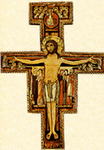World Day of Prayer for Consecrated Life
Tomorrow, Sunday 3 February 2008, is the annual World Day of Prayer for Consecrated Life. This usually falls on the Sunday closes to the Feast of the Presentation of the Lord in the Temple (which is today, Saturday 2 Feburary). And, tomrrow happily coincides with the (optional) memorial of the Armenian holy bishop Blase of Sebaste -- the traditional blessing of throats!
Contemporary image of Saints Clare and Francis of Assisi surrounded by men and women Franciscans and Sisters Moon and the Stars and Brother Sun, from Francis' Canticle of the Creatures
All Christians are "consecrated" to the Lord through the Sacrament of Baptism, so what does this mean, "consecrated life"?
The term "consecrated life" became a popular term for religious life during the pontificate of the late Pope John Paul II, when he wrote a treatise called Vita Consecrata (consecrated life in Latin) in the early 1990s.
Yes, all Christians are consecrated to the Lord in baptism -- the various passages in the New Testament (especially the letters of St. Paul the Apostle) testify to this truth. We are told we are a "temple of the Holy Spirit", "heirs of God and co-heirs with Christ", "born again", "a new creation", "a royal priesthood, a holy nation and a people which belongs uniquely to the Lord" and "the People of God".
But since the very beginning centuries of the Church, particularly in the Christian East, there has been a continual movement of certain men and women who discerned they were called by the Lord to a different sense of "vocation" than their peers. We have some evidence of this prior to the fourth century, but the two classical personages of this movement were St. Paul the Hermit and St. Anthony of the Desert (also called "the Abbot" and "the Great") of Egypt.
Originally they went into the desert to "escape the world". This meant that they wanted to consecrate their entire lives to the Lord through prayer, silence, mortifications, penances and work. They believed that living "in the world" was a great distraction and so they wanted to be free of all distractions, following the example of the Lord Jesus who, after his baptism, went into the desert for forty days and nights.
Many did so for the purpose of leading a penitential life. Perhaps they had committed grevious sins and determined that their only hope for salvation in the Lord was to avoid all possible contact with their former lives and begin an entirely new life away from the world. Others simply wanted to live for the Lord Jesus alone -- in prayer and with work.
The movement would eventualy spread throughout the Christian world -- Persia, Greece, Italy, Ireland. Great saints emerge from this movement, countless saints. Over the course of centuries, Western monasticism would develop into what we know as religiious life in our day and age. Rather than stay in monasteries, many men and women discerned their vocation to serve among the poor, to educate, to assist the sick and the dying, to preach, to go among non-believers as missionaries or to preach among the baptized, calling them to deeper relationshiop with the Lord and to conversion.
Our own Franciscan movement, begun with Sts. Francis and Clare in the early 13th century helped change religious life from the monastery to the city and beyond. All of these are examples of "consecrated life."

Bro. Mario Nagy, OFM, of the Assumption BVM Province, on mission in Siberia, Russia, receiving the first (simple) profession of a Russian Franciscan novice
Quite simply, it is discerning the Lord's call in our lives to deepen our baptismal consecration. This disceernment into religious life includes looking critically at our world (not to be negative but to see it as it really is, from the Lord's perspective, through prayer and familiarity with Holy Tradition [including Sacred Scripture]).
The Vita Consecrata takes many forms in the Catholic Church. As Franciscan friars, we seek to serve the Lord and his Church by striving to live and proclaim the Gospel of Jesus Christ like St. Francis of Assisi, our founder, and his early band of "Penitents of Assisi". These he would name, "friars minor", or lesser brothers.
By responding to the Lord's call in faith, that is, a Franciscan vocation, we trust the God is calling us to live in fraternity as brothers, to pray together according to the norms of the Catholic Church (Roman and Byzantine [Ruthenian] Rites), to grow in our relationship with the Lord through personal prayer, days of recollection, spiritual direction and retreats and to become appropriately educated and trained so that we may adequately serve in various capacities. All of this is encompassed with the desire to identify with the Lord Jesus who "became poor for our sake so that we could become rich in the mercy of God". This is what both Sts. Francis and Clare of Assisi desired with all their hearts.
They listened to the Gospels and responded to them, even imperfectly, because of their love for Jesus and his People, the Church. That is what imples us, like St. Paul wrote the Galatian Christians in the New Testament. The love of Jesus Christ impels us to seek him as our greatest good in consecrated life as vowed religious. This we believe is fulfilling our baptismal vows and consecration to the Lord -- to God's glory and for the life of his People.



No comments:
Post a Comment